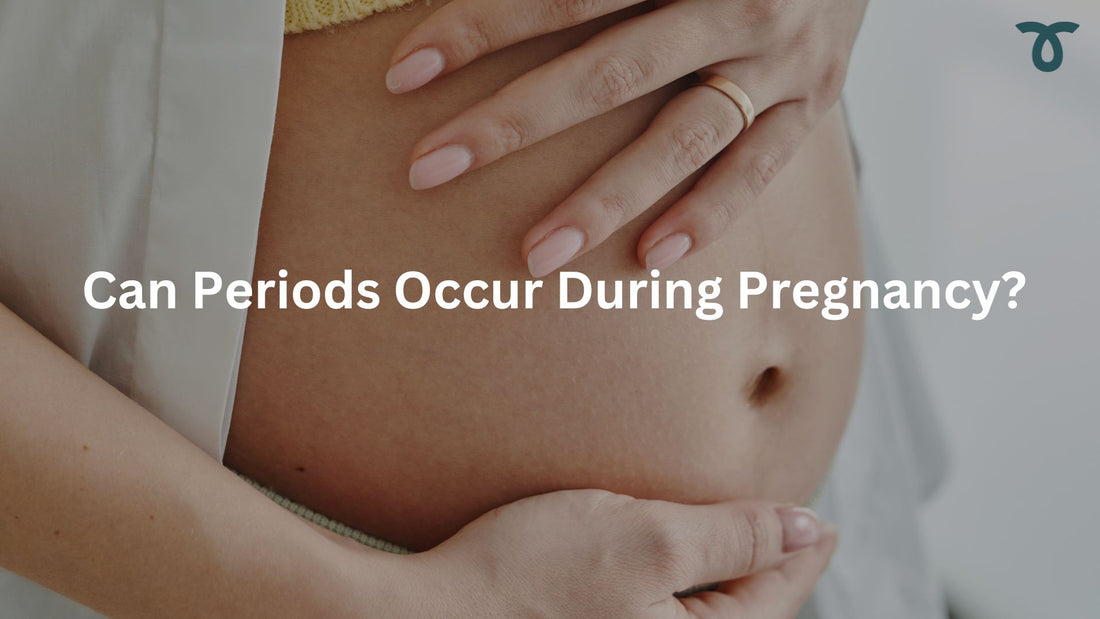The Basics of Period and Pregnancy:
The menstrual cycle includes a period, a natural process where the uterine lining is shed if no fertilized egg implants. Conversely, pregnancy begins once a fertilized egg implants in the uterus, setting off hormonal changes that halt ovulation and menstrual bleeding. These changes, mainly increases in hormones like progesterone and estrogen, maintain the uterine lining for fetal development and prevent further menstrual cycles. Thus, it is medically impossible to experience a true menstrual period during pregnancy, highlighting the body's intricate adjustments to support the onset of pregnancy. This clear distinction emphasizes the complexity of reproductive processes, which shift significantly to nurture potential new life.
Spotting vs. Menstrual Periods:
Many women experience bleeding during pregnancy, which is often confused with regular menstrual periods. However, this bleeding, commonly known as spotting, differs significantly in its causes, characteristics, and implications for maternal and fetal health. Spotting is usually lighter than a normal menstrual flow and can range in color from pink to dark brown. It's important for expectant mothers to recognize that this is a relatively common occurrence, yet it's crucial to understand its potential causes to ensure timely and appropriate care.
One of the earliest and most benign reasons for spotting is implantation bleeding. This occurs when the fertilized egg attaches itself to the uterine lining, usually around the time one's period would have been due. The spotting is typically light and short-lived. Another cause of spotting can be changes in the cervix, which becomes more sensitive and prone to bleeding during pregnancy due to increased blood flow and hormonal changes.
However, not all causes of spotting are harmless. It can also be a sign of conditions that require immediate medical attention, such as an ectopic pregnancy, where the embryo implants outside the uterus, or placenta previa, a condition where the placenta covers the cervix. Both situations pose serious risks to the pregnancy and may present with spotting or bleeding as an early warning sign.
Understanding these differences is crucial for the health and safety of both mother and child. Spotting during pregnancy should prompt a discussion with a healthcare provider to rule out any serious conditions and to ensure the ongoing health of the pregnancy.
Implantation Bleeding:
Implantation bleeding stands as one of the initial indicators of pregnancy, occurring when a fertilized egg nestles into the uterus's lining. This event marks the beginning of pregnancy, as the embryo establishes a connection with the maternal blood supply to receive the nutrients and oxygen necessary for growth. Unlike the more substantial flow of a menstrual period, implantation bleeding is generally light and brief, with the colour spectrum ranging from a faint pink to a more noticeable brownish hue. This variance in colour is attributed to the blood taking longer to exit the body, thus undergoing oxidation which darkens its appearance.
The timing of implantation bleeding closely aligns with when one might anticipate the start of their menstrual period, which can lead to confusion. Typically occurring 10 to 14 days after conception, this bleeding is one of the first physical signs of pregnancy many women notice. However, it's crucial to understand the distinctions between implantation bleeding and menstrual bleeding. Menstrual bleeding is the result of the shedding of the uterine lining in the absence of pregnancy, characterized by a heavier flow and a duration of several days. In contrast, implantation bleeding is lighter, and shorter, and signifies the successful attachment of the embryo to the uterine wall.
Recognising these differences is essential not only for early pregnancy detection but also for understanding the various changes occurring within the body. Should you experience any form of bleeding, consulting with a healthcare provider is advisable to confirm pregnancy and ensure the health and well-being of both the mother and the developing baby.
Why Period Stops During Pregnancy:
The halting of the menstrual cycle during pregnancy is a fascinating and complex biological process, governed by the body's natural hormonal adjustments. This cessation is a crucial adaptation that supports the growth and development of the fetus, marking a significant shift in the reproductive system's function. Key among the hormonal changes is the increase in progesterone levels, a hormone pivotal for pregnancy maintenance. Progesterone's role is multifaceted; it thickens the uterine lining, creating a supportive and nutrient-rich environment for the fertilized egg to implant and grow. Furthermore, it prevents the muscles of the uterus from contracting, which could potentially dislodge the implanted embryo.
As the pregnancy progresses, the body continues to produce and regulate various hormones to sustain the pregnancy. For example, human chorionic gonadotropin (hCG), produced by the cells surrounding the growing embryo, further signals the body to maintain the uterine lining and not to shed it, as would happen in a regular menstrual cycle. Additionally, estrogen levels rise, supporting the growth of the placenta and stimulating the development of the fetus's organs.
These hormonal adjustments are essential for creating an optimal uterine environment, ensuring that the embryo and later the fetus can thrive. The cessation of the Period is, therefore, a natural and necessary response to pregnancy, indicating that the body is effectively adapting to nurture new life. Understanding this intricate balance of hormones sheds light on the remarkable capabilities of the human body during pregnancy, emphasizing the importance of a stable and supportive internal environment for fetal development.
Cases of Bleeding During Pregnancy:
While true menstrual periods do not occur during pregnancy, various forms of bleeding can happen, often leading to confusion. Apart from implantation bleeding, other causes include:
- Cervical Changes: Pregnancy can cause the cervix to become more sensitive and prone to bleeding, especially after examinations or sexual intercourse.
- Miscarriage: Bleeding in early pregnancy can sometimes indicate a miscarriage, particularly if accompanied by cramping and the passage of tissue.
- Ectopic Pregnancy: This medical emergency occurs when a fertilized egg implants outside the uterus, often leading to bleeding.
- Placenta Issues: Conditions like placenta previa (where the placenta covers the cervix) or placental abruption (where the placenta detaches from the uterus) can cause significant bleeding and require immediate medical attention.
When to Seek Medical Advice:
Any bleeding during pregnancy, regardless of the amount or timing, warrants a consultation with a healthcare provider to ensure the health and safety of both the mother and the fetus. Early diagnosis and management of any underlying issues are critical for a healthy pregnancy.
While the notion of having a period during pregnancy is a common misconception, the reality is that menstrual bleeding ceases upon conception. However, various types of bleeding can occur for different reasons during pregnancy, some of which require medical attention. It is essential for expectant mothers to be informed about the differences between menstrual periods and pregnancy-related bleeding to navigate their pregnancy with confidence and peace of mind.
Remember, every pregnancy is unique, and what's normal for one person may not be for another. Always consult with your healthcare provider about any concerns regarding bleeding during pregnancy to ensure the well-being of both you and your baby. Through understanding and vigilance, you can better navigate the journey of pregnancy and prepare for the arrival of your new addition.
In crafting this comprehensive guide, we've adhered to SEO best practices, incorporating relevant keywords to ensure high visibility and accessibility for those seeking information on this important topic. Our goal is to empower women with knowledge, debunk myths, and promote a healthy pregnancy journey for all.





